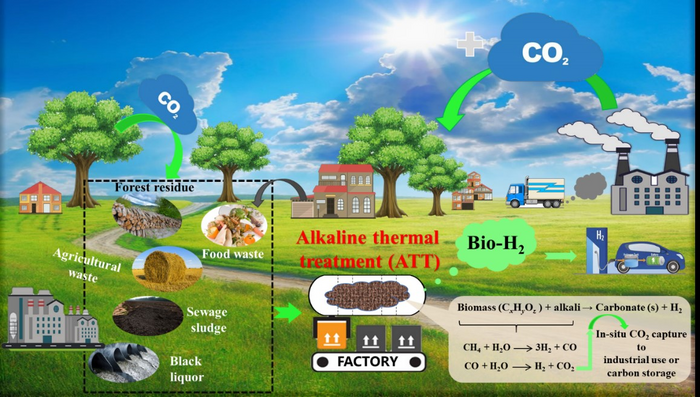Hydrogen, viewed as the “ultimate energy” for the 21st century, promotes benefits like being clean and renewable and is storable and adaptable.
 The process of hydrogen production with carbon storage by alkaline thermal treatment of biomass. Image Credit: KeAi Publishing
The process of hydrogen production with carbon storage by alkaline thermal treatment of biomass. Image Credit: KeAi Publishing
The International Energy Agency forecasts that 115 million tons of hydrogen will be needed in 2030 to create global carbon dioxide net emissions zero by 2050. This is responsible for making green hydrogen a hopeful avenue to a carbon-free society.
Using biomass for hydrogen production, it is possible to decrease carbon emissions made by fossil fuels, thus aiding in the acknowledgment of the declining energy crisis.
The novel alkaline thermal treatment (ATT) technology for hydrogen production includes pyrolysis at atmospheric pressure and low temperature. From the viewpoint of the total biomass life cycle, ATT has the considerable ability for “negative carbon emissions” and could replace a few fossil fuels.
In a review reported in the KeAi journal Carbon Resources Conversion, a research group extensively analyzed the latest advance in ATT of biomass for hydrogen production.
There are many factors that affect the hydrogen production efficiency from ATT of biomass. They include alkali, feedstock, catalysts, process parameters, and reactors, among others.
Guojie Liu, Study First Author and Ph.D. Student, School of Chemical Engineering, Sichuan University
Liu added, “However, we must first clarify the fundamental role and synergy of alkali and catalysts in the ATT reaction and the conversion mechanism of biomass, and then use that knowledge to guide the development of more effective upgrading strategies and even breakthroughs in larger-scale applications.”
To fulfill that, the team hopes that to optimize hydrogen production efficiency from the ATT reaction, the alkali utilized must promote biomass conversion into small gas intermediates and in-situ carbon storage.
Furthermore, by overcoming the kinetic limitation of the reformation reaction under low pressure and temperature in the ATT process, hydrogen production efficiency can be enhanced, and the synergy between alkali and metal catalysts can be fully demonstrated.
Houfang Lu, Professor, School of Chemical Engineering, Sichuan University
After the review, four significant conclusions were withdrawn. To better comprehend the transformation of model substances via different alkalis and determine highly right biomass, further study is required.
To fix an ideal catalyst system depending on the intermediate products of the ATT reaction, an analysis should be performed into the deactivation mechanism of the catalyst, the interaction happening between the active site and carrier, and the catalytic structure-activity relationship.
Besides, when weighing the benefits and drawbacks of in-situ and ex-situ reactions, designing rational reactors and developing effective inlet or outlet methods are main to defeating issues like coking, limited mass transfer, and catalyst regeneration caused by solid-solid reactions. Lastly, economic assessment and energy consumption analysis must be performed.
Lu added, “We hope that these points will guide forthcoming experiments on hydrogen production via biomass ATT processes to realize the industrialization of this technology.”
Journal Reference:
Liu, G., et al. (2023) A green route for hydrogen production from alkaline thermal treatment (ATT) of biomass with carbon storage. Carbon Resources Conversion. https://doi.org/10.1016/j.crcon.2023.04.001.